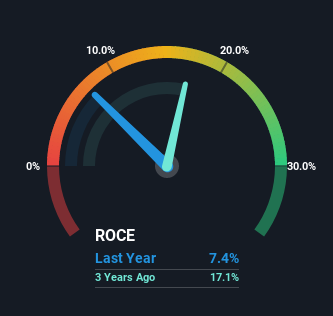- South Africa
- /
- Specialty Stores
- /
- JSE:WVR
The Returns On Capital At HomeChoice International (JSE:HIL) Don't Inspire Confidence
Finding a business that has the potential to grow substantially is not easy, but it is possible if we look at a few key financial metrics. In a perfect world, we'd like to see a company investing more capital into its business and ideally the returns earned from that capital are also increasing. Put simply, these types of businesses are compounding machines, meaning they are continually reinvesting their earnings at ever-higher rates of return. However, after investigating HomeChoice International (JSE:HIL), we don't think it's current trends fit the mold of a multi-bagger.
Understanding Return On Capital Employed (ROCE)
For those who don't know, ROCE is a measure of a company's yearly pre-tax profit (its return), relative to the capital employed in the business. Analysts use this formula to calculate it for HomeChoice International:
Return on Capital Employed = Earnings Before Interest and Tax (EBIT) ÷ (Total Assets - Current Liabilities)
0.074 = R374m ÷ (R5.6b - R545m) (Based on the trailing twelve months to December 2022).
Therefore, HomeChoice International has an ROCE of 7.4%. In absolute terms, that's a low return and it also under-performs the Specialty Retail industry average of 14%.
Check out our latest analysis for HomeChoice International

Historical performance is a great place to start when researching a stock so above you can see the gauge for HomeChoice International's ROCE against it's prior returns. If you'd like to look at how HomeChoice International has performed in the past in other metrics, you can view this free graph of past earnings, revenue and cash flow.
What The Trend Of ROCE Can Tell Us
In terms of HomeChoice International's historical ROCE movements, the trend isn't fantastic. Over the last five years, returns on capital have decreased to 7.4% from 24% five years ago. However it looks like HomeChoice International might be reinvesting for long term growth because while capital employed has increased, the company's sales haven't changed much in the last 12 months. It's worth keeping an eye on the company's earnings from here on to see if these investments do end up contributing to the bottom line.
What We Can Learn From HomeChoice International's ROCE
To conclude, we've found that HomeChoice International is reinvesting in the business, but returns have been falling. And in the last five years, the stock has given away 52% so the market doesn't look too hopeful on these trends strengthening any time soon. In any case, the stock doesn't have these traits of a multi-bagger discussed above, so if that's what you're looking for, we think you'd have more luck elsewhere.
If you want to know some of the risks facing HomeChoice International we've found 5 warning signs (2 are a bit concerning!) that you should be aware of before investing here.
While HomeChoice International isn't earning the highest return, check out this free list of companies that are earning high returns on equity with solid balance sheets.
Valuation is complex, but we're here to simplify it.
Discover if Weaver Fintech might be undervalued or overvalued with our detailed analysis, featuring fair value estimates, potential risks, dividends, insider trades, and its financial condition.
Access Free AnalysisHave feedback on this article? Concerned about the content? Get in touch with us directly. Alternatively, email editorial-team (at) simplywallst.com.
This article by Simply Wall St is general in nature. We provide commentary based on historical data and analyst forecasts only using an unbiased methodology and our articles are not intended to be financial advice. It does not constitute a recommendation to buy or sell any stock, and does not take account of your objectives, or your financial situation. We aim to bring you long-term focused analysis driven by fundamental data. Note that our analysis may not factor in the latest price-sensitive company announcements or qualitative material. Simply Wall St has no position in any stocks mentioned.
About JSE:WVR
Weaver Fintech
Operates as a fintech company, provides financial services.
Proven track record with slight risk.
Market Insights
Community Narratives



